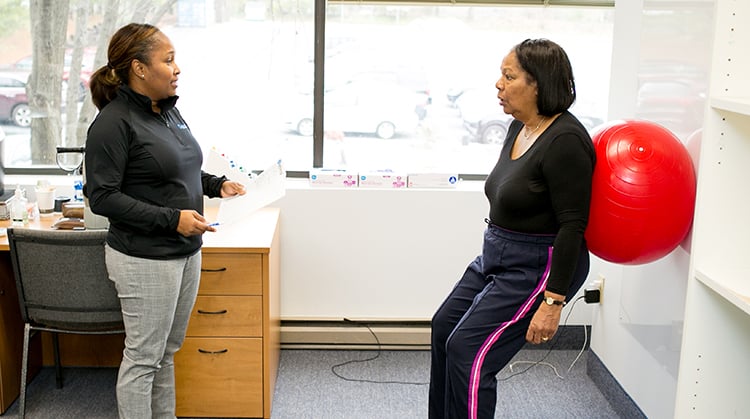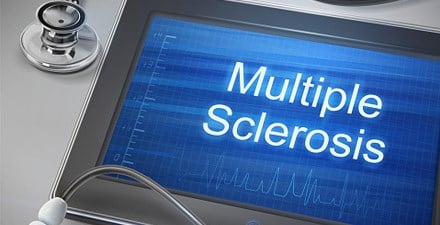Physical Therapy Guide to Multiple Sclerosis
Multiple sclerosis is a chronic, usually progressive, disease that primarily affects young adults. Approximately 400,000 people in the United States and 2.5 million people worldwide have been diagnosed with MS. Its effects vary widely. Although there is no known cure for the disease, it can be successfully controlled with medical management and rehabilitation. Physical therapists help people with MS regain and maintain strength, flexibility, and general fitness, and to live active, productive lives.
Physical therapists are movement experts. They improve quality of life through hands-on care, patient education, and prescribed movement. You can contact a physical therapist directly for an evaluation. To find a physical therapist in your area, visit Find a PT.
What Is Multiple Sclerosis?
Multiple sclerosis is a disease that involves the loss of myelin, a material that covers and protects the nerves in the body's central nervous system. Without myelin, nerves cannot properly communicate with each other. MS symptoms vary from person-to-person, depending on what part of the nervous system is affected, including structures that control movement, sensation, and mental and emotional processes. Often, one of the first signs of MS is a change in vision, such as double vision. Nearly all persons with MS also report difficulty walking, and with other body movements.
Although MS is rarely fatal, its complications can be severe, including difficulty breathing, injury due to falls, and a general lack of mobility. With appropriate medical support and physical therapy, the disease process can be controlled, and movement can be improved and maintained.
Signs and Symptoms
MS leads to multiple signs and symptoms that may include:
- Fatigue that does not go away with rest.
- Difficulty walking and problems with balance.
- Stiffness and spasms or a feeling of heaviness in your legs or arms.
- Bladder and/or bowel problems, such as urgency or leaking.
- Sexual dysfunction, such as less sensation, dryness, less desire, and trouble reaching orgasm.
- Memory and thinking problems.
- Pain and other unpleasant sensations.
- Emotional or mood problems, including depression and apathy.
- Vision problems, such as control of eye movements, seeing double, and blurry vision.
- Dizziness or vertigo.
- Speech and swallowing problems.
Medical management of the disease can improve many, but not all, of these signs and symptoms. Because MS affects each person differently, an individual may experience unalike signs and symptoms than another person with the same type of MS.
Fluctuating symptoms
Symptoms of MS can come and go, and the disease can go into remission. When a relapse is experienced, the symptoms can vary in duration and strength. Becoming overheated can contribute to a relapse, such as during exercise and in warm weather. A severe relapse can require hospitalization, but milder symptoms may be managed with medication at home. After a relapse occurs, the symptoms will again settle down, but may cause a slight loss of function. Some individuals will recover well from a relapse, but others may experience a higher level of disability.
When MS goes into remission, you feel stable and may be able to gain some improvement in your ability to perform daily activities. Your physical therapist can help you gain strength and endurance during a remission.
Depression
Depression affects the majority of individuals with MS, with a 70% higher risk than in same-aged people without MS. It can complicate the initial adjustment period following diagnosis. Facing the ongoing challenges of MS can be overwhelming at times, and depression can significantly affect a person's quality of life. For these reasons, depression should be medically managed, along with control of the disease itself. Your health care team, including your physician and your physical therapist, will work with you to reach and maintain your goals for living an active, productive life.
How Is It Diagnosed?
A diagnosis of MS is made if the following three criteria have been met:
- Clinical or MRI evidence of damage to the central nervous system occurring in 2 different parts of the body (ie, symptoms in arms and legs, sensation and motor skills, vision, and speech); and
- Clinical or MRI evidence of recent damage to the brain, spinal cord, or optic nerve that occurred at different points in time, or abnormal findings in the cerebral spinal fluid obtained via a lumbar puncture; and
- Ruling out of conditions that may have similar symptoms such as stroke, tumor, or other progressive neurologic diseases.
How Can a Physical Therapist Help?
Physical therapy for people with MS focuses on helping them return to the roles performed at home, work, and in the community. Your first physical therapy visit will consist of a complete examination to determine your impairments (ie, weakness, pain, loss of sensation, balance, or coordination), activity limitations (ie, daily activities that you are having difficulty with, such as walking, dressing, or getting into your vehicle), and participation restrictions (ie, an alteration to your normal activities, such as difficulty completing work and household tasks, caring for yourself or your family, or performing recreational and/or social activities). Following the examination, your physical therapist will develop a specific exercise program for you based on your condition and goals, including a home-exercise program and education on community-based exercise options.
Research studies have found that people in the early stages of MS may experience changes in their walking ability, balance, and breathing. If ignored, these early signs can lead to further disability. When someone receives a diagnosis of MS, the best option is to begin physical therapy right away to help improve any mild challenges, and possibly slow down the progression of the symptoms of the disease.

Exercise programs. Exercises beneficial to someone with early MS include strengthening, balance training, stretching, and aerobic training using a treadmill, rowing machine, or any type of stationary bike. In general, the program should be based on the individual’s ability, and progressed at that person’s tolerance level. The goal of physical therapy in the early stages of MS is to help you perform all your normal activities and use your optimal pacing techniques.
As MS progresses, further disability can occur. Research in physical therapy has identified benefits for people with MS in many areas after completing different types of exercise programs. Aerobic exercise, using equipment, such as an elliptical machine, a treadmill, or a stationary bike can improve your leg strength, walking, and exercise endurance, balance, and mood.
General strengthening. Other types of exercise therapy include general strengthening for the arms and legs, balance training, stretching activities, and relaxation techniques. These types of exercise have been found to improve walking ability, leg strength, and general balance during normal activities.
Aquatic therapy. People with MS may find aquatic exercise a beneficial way to increase their activity. Pool temperature can help maintain a normal core body temperature during exercise to support your general strength. The buoyancy of water can offer support for people who cannot walk on solid ground, and provide gentle resistance to exercise movements. The Multiple Sclerosis Association of America strongly supports the use of aquatic therapies for people with MS. A list of MS aquatic programs can be found at mymsaa.org.
Tai chi and yoga. Programs that include tai chi and yoga may also be beneficial for people with MS. Tai chi is a low-intensity, movement-based form of exercise that can be performed in standing or sitting positions. Deep breathing is included in the technique. Yoga includes breath work, exercises for strengthening and flexibility, and meditation or relaxation techniques. A physical therapist trained in these programs will modify these exercises specifically for each individual's needs and goals.
All adults should complete at least 150 minutes of moderate exercise a week (30-minute sessions, 5 days a week), per the Physical Activity Guidelines for Americans developed by the Office of Disease Prevention and Health Promotion in partnership with the President's Council on Fitness, Sports, and Nutrition.
Can This Injury or Condition Be Prevented?
Scientists have yet to determine a specific cause of MS. The best measure of prevention is the maintenance of a healthy lifestyle. Performing at least 150 minutes of moderate physical activity per week (30 minutes per day, 5 days a week), eating a healthy diet, getting an appropriate amount of sleep, and managing daily stress are all aspects of a healthy lifestyle. Early diagnosis and appropriate treatment for MS can lead to a more successful and active life.
What Kind of Physical Therapist Do I Need?
All physical therapists are prepared through education and experience to treat multiple sclerosis. However, MS is a unique condition and you may want to consider:
- A physical therapist who is experienced in treating people with neurological conditions, specifically multiple sclerosis.
- A physical therapist who is a board-certified clinical specialist or who has completed a residency or fellowship in neurologic physical therapy. This physical therapist has advanced knowledge, experience, and skills that may apply to this condition.
- Physical therapists who have earned a Multiple Sclerosis Certified Specialist certification from the Consortium of Multiple Sclerosis Centers, and have spent a minimum of at least 1 year working with MS patients and have passed a required exam.
You can find physical therapists who have these and other credentials by using Find a PT, the online tool built by the American Physical Therapy Association to help you search for physical therapists with specific clinical expertise in your geographic area.
General tips when you're looking for a physical therapist (or any other health care provider):
- Get recommendations from family, friends, or other health care providers.
- When you contact a physical therapy clinic for an appointment, ask about the physical therapists' experience in helping people who have multiple sclerosis.
- During your first visit with the physical therapist, be prepared to describe the physical issues and symptoms that are causing the most difficulty.
- Plan to talk about what goals are most important to help increase your independence performing daily activities, and ensure a healthy future.
The American Physical Therapy Association believes that consumers should have access to information that could help them make health care decisions and also prepare them for their visit with their health care provider.
The following articles provide some of the best scientific evidence related to physical therapy treatment of multiple sclerosis. The articles report recent research and give an overview of the standards of practice both in the United States and internationally. The article titles are linked either to a PubMed* abstract of the article or to free full text, so that you can read it or print out a copy to bring with you to your health care provider.
Thompson AJ, Banwell BL, Barkhof F, et al. Diagnosis of multiple sclerosis: 2017 revisions of the McDonald criteria. Lancet Neurol. 2018;17(2):162–173. Article Summary in PubMed.
Khan F, Amatya B. Rehabilitation in multiple sclerosis: a systematic review of systematic reviews. Arch Phys Med Rehabil. 2017;98(2):353–367. Article Summary in PubMed.
Campbell E, Coulter EH, Mattison PG, Miller L, McFadyen A, Paul L. Physiotherapy rehabilitation for people with progressive multiple sclerosis: a systematic review. Arch Phys Med Rehabil. 2016;97(1):141–151.e3. Free Article.
Sandroff BM, Motl RW, Scudder MR, DeLuca J. Systematic, evidence-based review of exercise, physical activity, and physical fitness effects on cognition in persons with multiple sclerosis. Neuropsychol Rev. 2016;26(3):271–294. Article Summary in PubMed.
Platta ME, Ensari I, Motl RW, Pilutti LA. Effect of exercise training on fitness in multiple sclerosis: a meta-analysis. Arch Phys Med Rehabil. 2016;97(9):1564–1572. Free Article.
Bsteh G, Ehling R, Lutterotti A, et al. Long term clinical prognostic factors in relapsing-remitting multiple sclerosis: insights from a 10-year observational study. PLoS One. 2016;11(7):e0158978. Free Article.
Gunn H, Markevics S, Haas B, Marsden J, Freeman J. Systematic review: the effectiveness of interventions to reduce falls and improve balance in adults with multiple sclerosis. Arch Phys Med Rehabil. 2015;96(10):1898–1912. Free Article.
Jongen PJ, Heerings M, Lemmens WA, et al. A prospective web-based patient-centered interactive study of long-term disabilities, disabilities perception and health-related quality of life in patients with multiple sclerosis in the Netherlands: the Dutch Multiple Sclerosis Study protocol. BMC Neurol. 2015;15:128. Free Article.
Dalgas U, Stenager E, Sloth M, Stenager E. The effect of exercise on depressive symptoms in multiple sclerosis based on meta-analysis and critical review of the literature. Eur J Neurol. 2015;22(3):443–e34. Article Summary in PubMed.
Heine M, van de Port I, Rietberg MB, van Wegen EE, Kwakkel G. Exercise therapy for fatigue in multiple sclerosis. Cochrane Database Syst Rev. 2015;(9):CD009956. Free Article.
Fox RJ, Bacon TE, Chamot E, et al. Prevalence of multiple sclerosis symptoms across lifespan: data from the NARCOMS Registry [published correction appears in Neurodegener Dis Manag. 2016;6(2):178]. Neurodegener Dis Manag. 2015;5(6 Suppl):3–10. Free Article.
Martin-Valero R, Zamora-Pascual N, Armenta-Peinado JA. Training of respiratory muscles in patients with multiple sclerosis: a systematic review. Respir Care. 2014;59(11):1764–1772. Free Article.
Spooren AI, Timmermans AA, Seelen HA. Motor training programs of arm and hand in patients with MS according to different levels of the ICF: a systematic review. BMC Neurol. 2012;12:49. Free Article.
Kjølhede T, Vissing K, Dalgas U. Multiple sclerosis and progressive resistance training: a systematic review. Mult Scler. 2012;18(9):1215–1228. Article Summary in PubMed.
Toomey E, Coote SB. Physical rehabilitation interventions in nonambulatory people with multiple sclerosis: a systematic review. Int J Rehabil Res. 2012;35(4):281–291. Article Summary in PubMed.
*PubMed is a free online resource developed by the National Center for Biotechnology Information (NCBI). PubMed contains millions of citations to biomedical literature, including citations in the National Library of Medicine’s MEDLINE database.
Expert Review:
Apr 23, 2018
Revised:
Apr 23, 2018
Content Type: Guide
Multiple Sclerosis
Tara McIsaac
PT, PhD
You Might Also Like...
Article
Neurologic Physical TherapyJul 9, 2024
Neurologic physical therapists evaluate and treat conditions caused by nervous system diseases or injuries. They care for people of all ages and work with
Podcast
Physical Therapy: Gateway to Adventure, Independence, and CommunitySep 3, 2020
Physical therapist Carol-Ann Nelson is helping people with neurologic conditions enjoy the great outdoors at Destination Rehab.
Podcast
Country Music Star Clay Walker Talks About Managing MSJan 10, 2017
Clay Walker discusses his M.S. diagnosis and how he manages it while pursuing his passions for music and performing.


